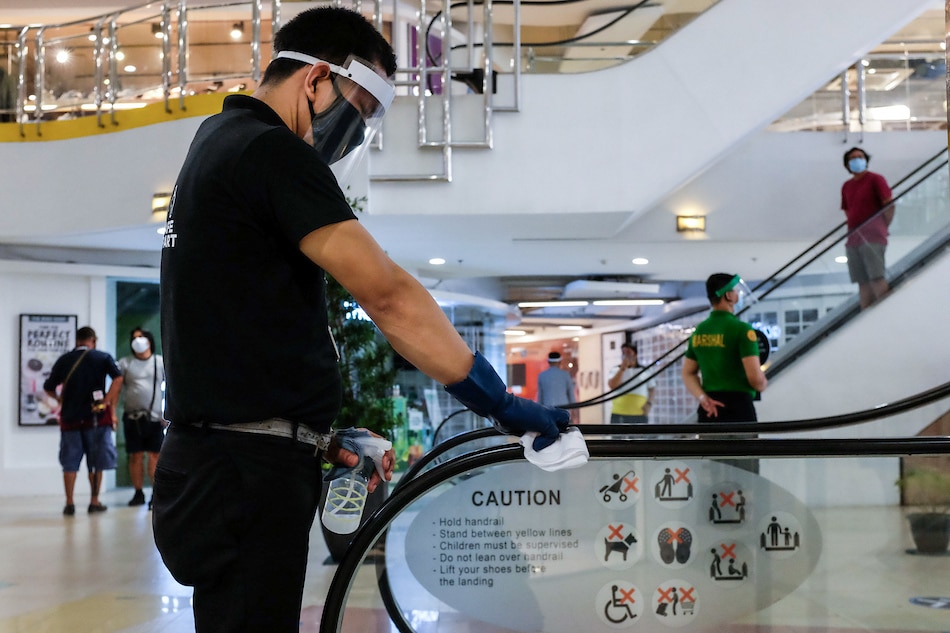GCQ in Metro Manila extended until Aug. 15 even as COVID-19 cases increase | ABS-CBN
ADVERTISEMENT

Welcome, Kapamilya! We use cookies to improve your browsing experience. Continuing to use this site means you agree to our use of cookies. Tell me more!
GCQ in Metro Manila extended until Aug. 15 even as COVID-19 cases increase
GCQ in Metro Manila extended until Aug. 15 even as COVID-19 cases increase
Arianne Merez,
ABS-CBN News
Published Jul 31, 2020 09:48 AM PHT
|
Updated Jul 31, 2020 11:52 AM PHT
MANILA (UPDATE) - President Rodrigo Duterte has extended the general community quarantine in Metro Manila to August 15 even as the number of COVID-19 infections in the country continues to increase.
MANILA (UPDATE) - President Rodrigo Duterte has extended the general community quarantine in Metro Manila to August 15 even as the number of COVID-19 infections in the country continues to increase.
Cebu City, which was formerly under modified enhanced community quarantine, will also transition to the more relaxed GCQ starting August 1, Presidential Spokesperson Harry Roque said.
Cebu City, which was formerly under modified enhanced community quarantine, will also transition to the more relaxed GCQ starting August 1, Presidential Spokesperson Harry Roque said.
Other areas that will remain under GCQ are:
Other areas that will remain under GCQ are:
-Bulacan
-Batangas
-Cavite
-Laguna
-Rizal
-Lapu-Lapu City
-Mandaue City
-Talisay City
-Minglanilla
-Consolacion
-Zamboanga City
-Bulacan
-Batangas
-Cavite
-Laguna
-Rizal
-Lapu-Lapu City
-Mandaue City
-Talisay City
-Minglanilla
-Consolacion
-Zamboanga City
ADVERTISEMENT
The decision comes even after the Philippines reported 3,954 new COVID-19 cases, the highest single-day tally since the country recorded its first COVID-19 case back in January.
The decision comes even after the Philippines reported 3,954 new COVID-19 cases, the highest single-day tally since the country recorded its first COVID-19 case back in January.
The record-high new cases pushed the country's cumulative total of COVID-19 infections to 89,374, of which, 22,327 are active.
The record-high new cases pushed the country's cumulative total of COVID-19 infections to 89,374, of which, 22,327 are active.
The President kept the capital region under GCQ despite an earlier pronouncement by his spokesperson that Metro Manila might revert back to the stricter modified enhanced community quarantine should the Philippines breach 85,000 cases by the end of July.
The President kept the capital region under GCQ despite an earlier pronouncement by his spokesperson that Metro Manila might revert back to the stricter modified enhanced community quarantine should the Philippines breach 85,000 cases by the end of July.
Officials earlier said the increase in COVID-19 infections is expected since the major easing of community quarantine protocols last month.
Officials earlier said the increase in COVID-19 infections is expected since the major easing of community quarantine protocols last month.
For Metro Manila and the Southern Tagalog Region (Calabarzon) to keep their GCQ classification, Roque said the government would implement strictly localized lockdowns in villages where 80 percent of the COVID-19 cases are reported.
For Metro Manila and the Southern Tagalog Region (Calabarzon) to keep their GCQ classification, Roque said the government would implement strictly localized lockdowns in villages where 80 percent of the COVID-19 cases are reported.
The following minimum health standards will also be strictly enforced: massive targeted testing, intensified tracing, and quarantine of close contacts; isolation of confirmed cases; and strict adherence to Oplan Kalinga or facility-based quarantine.
The following minimum health standards will also be strictly enforced: massive targeted testing, intensified tracing, and quarantine of close contacts; isolation of confirmed cases; and strict adherence to Oplan Kalinga or facility-based quarantine.
Government hospitals in the two regions are also directed to increase hospital beds dedicated to COVID-19.
Government hospitals in the two regions are also directed to increase hospital beds dedicated to COVID-19.
Metro Manila first transitioned to a more relaxed general community quarantine on June 1 since being placed on strict lockdown mid-March.
Metro Manila first transitioned to a more relaxed general community quarantine on June 1 since being placed on strict lockdown mid-March.
Economic managers have repeatedly shunned reverting Metro Manila to a stricter community quarantine, citing the need to resuscitate the economy.
Economic managers have repeatedly shunned reverting Metro Manila to a stricter community quarantine, citing the need to resuscitate the economy.
Read More:
Metro Manila GCQ
NCR GCQ
Duterte COVID
Duterte lockdown
coronavirus update
new normal
Philippines
lockdown
Rodrigo Duterte
COVID-19
ADVERTISEMENT
ADVERTISEMENT



